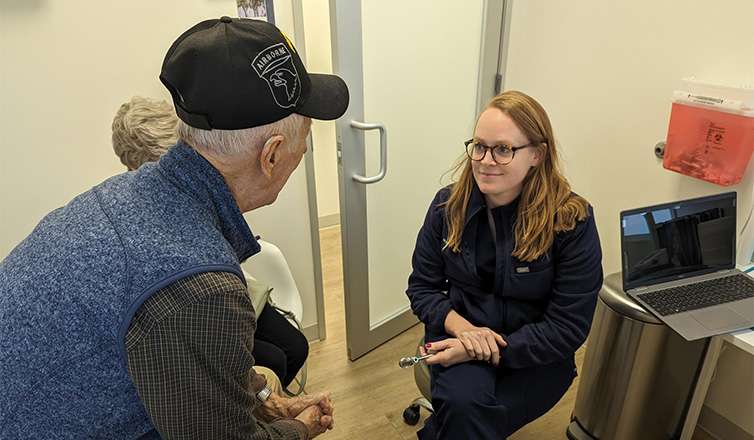Above image: ANC Neuromuscular Neurologist Hannah C. Machemehl in a clinical consultation
When patients are diagnosed with peripheral neuropathy, we work with them to help manage the condition, including examining how their diets may play a role. Nerves need certain nutrients to function properly, so what patients eat and drink can make a big difference in peripheral neuropathy management.
“Diet can play a role in peripheral neuropathy as it pertains to certain nutritional etiologies,” said neuromuscular neurologist Dr. Hannah Machemehl. “For example, diabetes is the leading cause of peripheral neuropathy, and poor glycemic control can lead to worsening symptoms over time.”
About 60 to 70 percent of people with diabetes are reported to have mild to severe nerve problems that can cause tingling, numbness, or burning in the feet, trunk, or pelvis. Those with diabetic neuropathy may be able to avoid further nerve damage by strictly controlling their blood glucose levels through a well-balanced, low-sugar diet.
There have also been links to obesity and high cholesterol with peripheral neuropathy, which often require dietary management for optimal prevention and treatment. In other instances, low levels or too high levels of certain vitamins can lead to peripheral neuropathy, specifically B vitamins like thiamine, cyanocobalamin, and pyridoxine. Excessive alcohol intake can be toxic to nerves and has also been shown to cause neuropathy.
Foods That Support Healthy Nerves
A balanced diet with fruits, vegetables, and whole foods is healthy for patients with neuropathy to ensure an adequate intake of vitamins and minerals. We work with each neuropathy patient to discuss the best healthy diets to fit their lifestyles. When choosing foods, neuropathy patients may want to consider these tips:
- Eat plenty of fruits and vegetables daily
- Avoid excessive alcohol intake
- Avoid excessive sugar intake
We also work with our neuropathy patients to determine if they need to take nutritional supplements for a specific deficiency identified through lab testing. For some patients who choose to avoid meat, it may be important to supplement certain additional vitamins. For patients with a history of bariatric surgery, absorption of some nutrients may be impacted, and additional supplements may be needed. In patients with diabetic neuropathy, it may be helpful to consider alpha lipoic acid as a supplement.
There are other foods and supplements that someone with peripheral neuropathy should avoid for healthy nerves.
“Excessive zinc ingested by taking supplements or excessive vitamin B6 or pyridoxine through supplements can be toxic to the nerves and should be avoided unless there is a specific indication for these treatments,” said Dr. Machemehl. “Additionally, heavy alcohol intake is harmful to nerves and can cause or worsen neuropathy. For patients with diabetes, excessive sugar can worsen neuropathy, if it causes a person’s diabetes to be poorly controlled.”
To learn more about the Austin Neuromuscular Center and what we treat, click here or call (512) 920-0140. And follow us on Facebook, LinkedIn, Twitter, and Instagram for important updates.
